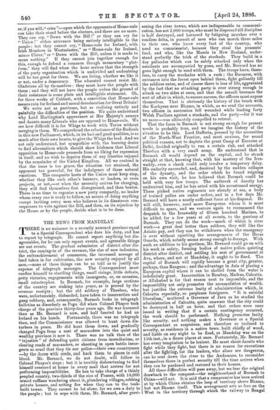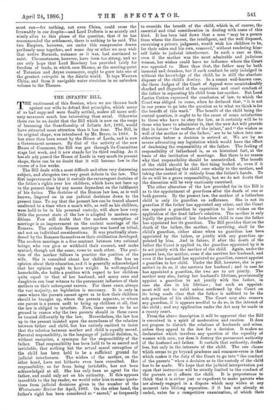THE NEWS FROM MANDELAY.
rERE is no nuisance in a recently annexed province equal to a Special Correspondent who does his duty, and has to report by telegraph. He cannot report anything but dis- agreeables, for he can only report events, and agreeable things are not events. The gradual submission of district after dis- trict, the coming-in of the revenue, the rise of new industries, the enfranchisement of commerce, the increased acreage of land taken in for cultivation, the new security enjoyed by all men,—none of these things can be so told as to justify the -expense of telegraph messages. The Correspondent must confine himself to startling things, small risings, little defeats, petty victories, engagements with insurgents, or, on occasion, small catastrophes. In Burmah, for example, large sections of the country are sinking into peace, as is proved by the revenue receipts ; but the old soldiery of Theebau, who were, unfortunately, disbanded, have taken to insurrection and gang robbery, and, consequently, Burmah looks in telegraph bulletins as disorderly as Pegu did when Colonel Phayre took charge of the province thirty-four years ago. He was harassed then as Mr. Bernard is now, and half fancied he had an Ireland on his hands. Fortunately, there was no telegraph then, and the Commissioner was allowed to hunt down dis- turbers in peace. He did hunt them down, and gradually changed Pegu from a nest of marauders into the quiet and wealthy province it now is. There was no talk then of the " injustice " of defending quiet citizens from incendiarism, or clearing roads of marauders, or shooting in open battle insur- gents so cruel that they tie our police—their own countrymen —by the dozen with cords, and hack them to pieces in cold blood. Mr. Bernard, we do not doubt, will follow in Colonel Phayre's steps ; but it is terribly disheartening to find himself censured at home in every mail that arrives for not performing impossibilities. He has to take charge of a thinly peopled country, two-thirds of the size of France, with 18,000 armed ruffians wandering about it, plundering villages, robbing private houses, and setting fire when they can to the teak- built towns. They cannot be let alone, for we owe a duty to the people ; but to cope with them, Mr. Bernard, after garri-
Boning the river towns, which are indispensable to communi- cation, has not 2,000 troops, who must be dispersed till discipline is half destroyed, and harassed by fatiguing marches over a roadless delta, in pursuit of men who can march three miles to their one, who know every foot of the country, who need no commissariat, because they steal the peasants' food, and who, like the Maoris in New Zealand, under- stand perfectly the trick of the stockade. They build in a day palisades which can be safely attacked only when the assailants are accompanied by guns, and Mr. Bernard has no guns light enough to send with them. The troops have, there- fore, to carry the stockades with a rush ; the Burmese, with entrances into the forest open behind them, fight gallantly till the soldiers enter, and of course there is loss of life, aggravated by the fact that no attacking party is ever strong enough to attack on two sides at once, and that the assault becomes the sort of affair in which, to ensure success, the officers must expose themselves, That is obviously the history of the brush with the Kachyens near Bhamo, in which, as we read the accounts, two officers in succession fell wounded while leading forty Welsh Fusiliers against a stockade, and the party—for it was no more—was ultimately compelled to retreat.
That the force in Burmah is not strong enough for present needs is probably true, and we imagine the history of the situation to be this. Lord Dufferin, pressed by the necessities of the North-West Frontier, and most anxious, for sound political reasons, not to deplete the great Camp of Exercise at Delhi, decided originally to run a certain risk, and attacked Theebau with a very small army. He understood that in Burmah all would depend on the capital, and he struck straight at that, knowing that, with his mastery of the Irra- waddy, even a check could only involve a temporary delay. His audacity succeeded, and, deceived by the sudden collapse of the dynasty, and the order which he found reigning on his own visit, he has believed that Burmah could be held with very few troops. The outbreak of dacoity has undeceived him, and he has acted with his accustomed energy. Three picked native regiments are already at sea, a body of trained police are under orders, and in a few days Mr. Bernard will have a nearly sufficient force at his disposal. He will still, however, need more Europeans, whom it is most difficult to spare, and we venture again to recommend the despatch to the Irrawaddy of fifteen hundred Marines, to be added, for a few years at all events, to the garrison of Burmah. They can do the work—much of which is river work—a great deal better than soldiers, they will like the Asiatic pay, and they can be withdrawn when the emergency is over without upsetting the arrangements of the Horse Guards, which nobody seems strong enough to derange. With such an addition to his garrison, Mr. Bernard could go on with his work in safety, forming bodies of native police, quieting district after district, and settling his seat of government at Ava, where, and not at Mandelay, it ought to be fixed. The capital of Burmah will rapidly become a great city, greater, perhaps, than Rangoon ; and the advantage in Asia of placing a European capital where it can be shelled from the water is indefinitely great. Insurrection in Bombay, Madras, Calcutta, or Allahabad is for that reason next to impossible, and the impossibility not only promotes the accumulation of wealth, but justifies the extreme lenity of administration which, in Calcutta especially, so perplexes foreigners. " It is suicidal liberalism," muttered a Governor of Java as he studied the administration of Calcutta, quite unaware that the city could be destroyed in half an hour, and that orders were once issued in writing that if a certain contingency occurred, the work should be performed. Nothing promotes lenity like security, and nothing makes a Governor or a Special Correspondent so suspicious, and therefore so inclined to severity, as residence in a native town, built chiefly of wood, and liable on any night to be fired, as Mandelay was on the 15th inst., in a dozen places at once. Fortunately, Mr. Bernard has every temptation to be lenient. He must shoot dacoits who
fight while they fight, but there is no reason for executions after the fighting, for the leaders, who alone are dangerous,
can be sent down the river to the Andamans, to reconsider themselves there in perfect security till the time arrives when they can be pardoned and restored to their homes. All these difficulties will pass away, but we fear the original drawback to the conquest—the neighbourhood of Burmah to
China—will not. It is said that a compromise has been arrived at by which China obtains the loop of territory above Bhamo, but not Bhamo itself. This arrangement sets us free on the West in the territory through which the railway to Bengal
must run—for nothing, not even China, could cross the Irrawaddy in our despite—and Lord Dufferin is so acutely and wisely alive to this phase of the question, that if he has recommended the settlement, there is nothing to be said. The two Empires, however, are under this compromise drawn perilously near together, and some day or other we may wish that native Burmah, nuisance as it was, had continued to exist. Circumstances, however, have been too strong, and we can only hope that Lord Rosebery has provided fairly for freedom of trade, in which case Bhamo, as the meeting-point of Turanian and Aryan commerce, ought to grow into one of the greatest entrep&s in the Asiatic world. It taps Western China, and from it navigable water stretches in an unbroken volume to the Thames.



































 Previous page
Previous page